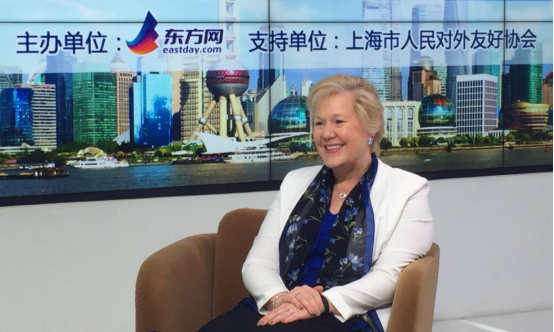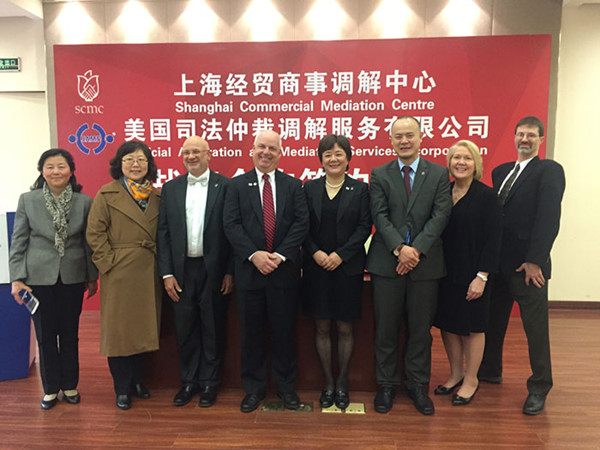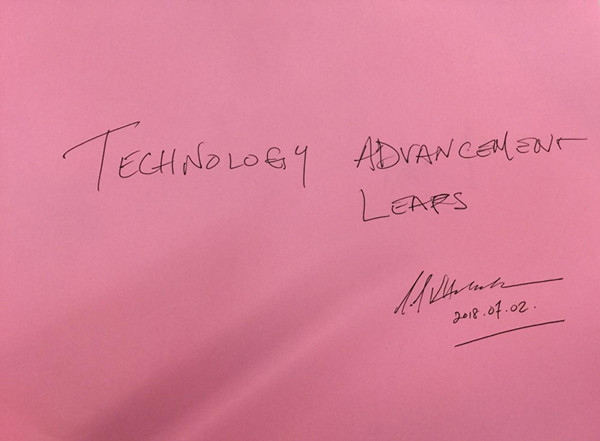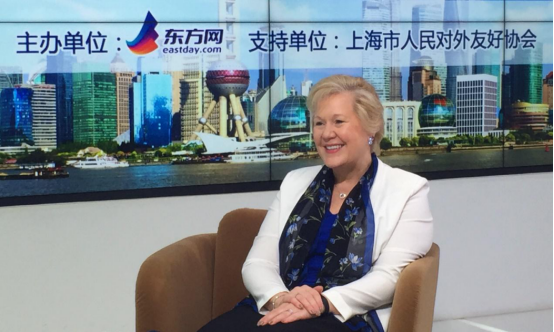


American lawyer dedicated to Chinese law industry for 13 years
Elegant and affable is the first impression Meg Utterback, an American female lawyer, makes on us. Meg came to China to study in the 1980s. After graduation she went back to America. Many years later, she returned to China and has been working and living here for more than ten years.

Meg has an interview with Eastday
13 years of witnessing the development of Chinese law
In the late 1970s, China began to gradually open its door. The first Sino-foreign Joint Venture Law was promulgated in 1979. The surge of foreign investment in China led Meg to feel that this would be a time of great change, so she was determined to go to China to study and research in the law field. After graduating from McGill University in 1985, she came to China’s Renmin University, where she spent two years doing graduate studies.
The simple life is Meg’s deepest memory of her graduate student life in China. She explained that everything in the school was simple. Supplies were scarce in the whole of Beijing and there were very few cars. People rode bikes or got on the public buses."Today's material goods are very rich. I can drive a BMW and go to any nice restaurant I want to and order all types of food. And in 1985, if you went to a restaurant, you would say 'I want this and that' and they would say,'we don’t have this, we don’t have that. We have tomato only' she smiled, with the words full of reminiscence.
After graduating from Renmin University in 1987, Meg returned to the United States. In 2005, since the US law firm she was working for planned to open a representative office in Shanghai, she was fortunate to be appointed here as the person in charge. Five years later, she made another major decision to join a Chinese law firm, King & Wood Law Firm."I never thought that China would develop so fast, and I could be so successful in the Chinese legal profession as a foreign lawyer," Meg said sincerely.
Besides being a partner at King & Wood, Meg has another identity in the Chinese legal profession, asone of the foreign mediators of the Shanghai Commercial Mediation Center, where her work is mainly to resolve international commercial disputes, currently serving the “Belt and Road”.
Meg, who loves China, hopes to become a “bridge” between Chinese customers and the foreign side. She explained her role in a Chinese law firm.“Since I am working fora Chinese law firm, I can combine my international vision with the understanding of many Chinese colleagues on Chinese corporate culture, thus serving Chinese companies’internationalization.”
Meg is highly qualified. She has represented US, European and Chinese companies at the International Chamber of Commerce, the China International Economic and Trade Arbitration Commission, the Hong Kong International Arbitration Centre, the Indian Council of Arbitration and in litigation before US courts in construction and commercial disputes.
She has been involved in a number of high profile arbitrations and litigations throughout China, and has assisted with asset tracing and enforcement of foreign arbitral awards. She has written numerous book chapters and articles regarding the management of evidence and the conduct of negotiations and hearing procedures for Chinese civil proceedings and China-related cross border disputes.
Speaking of her 13 years of experience in the Chinese legal industry, she is very excited."It can be said that I have witnessed the development of Chinese law and saw many gratifying changes in the legal profession. Today, lawyers are involved in the cases more timely. The provisions of the law are also more detailed. The judicial reform makes the profession of lawyers more meaningful.”
"In the past 13 years, I have seen the Chinese legal system is becoming more complex, lawyers are becoming more professional, and people are increasingly trusting the court. People’s legal awareness is also increasing. Ten years ago, you had a two-page contract and then a handshake. Today, people expect more from their contracts, they want to protect their legal rights and they are thinking in those ways. We didn’t have that 10 years ago."
As Meg mentioned, reform and opening up has caused China to undergo earth-shaking changes in a very short period of time. It is not only the achievements of reforms, but also the speed of reforms, especially the innovation in law.
Since opening up gives rise to increased international economic and trade cooperation, domestic dispute resolution methods are no longer adequate to settle international economic cooperation disputes. Therefore, China introduced a diversified dispute resolution mechanism (ADR) in its judicial reform. Established in 2011, the first independent third-party commercial mediation organization in mainland China, the Shanghai Commercial Mediation Center, is China's most iconic ADR institution.
“China's judicial reform has improved Chinese courts and laws. The establishment of the Shanghai Commercial Mediation Centeris a great measure for companies to find a quick and effective way to resolve disputes,” Meg said.
In November 2013, the Shanghai Commercial Mediation Center was invited to settle in the Shanghai Pilot Free Trade Zone. At the invitation of the Mediation Center, world-renowned mediation agencies from the UK, EU, Singapore and other places jointly established the International Commercial Joint Mediation Court, creating a new mediation mechanism.“In the Shanghai Pilot Free Trade Zone, foreign law firms can enjoy ventures with local law firms. Look at me, I am a foreigner and I am able to work in a Chinese firm. Chinese lawyers can work with their foreign colleagues and learn from other legal systems. All these are the influences reform and opening up has brought.”
Moreover, the mediation center also cooperates with a number of internationally renowned mediation organizations including the Hong Kong International Arbitration Centre, the Hong Kong Mediation Council, the Singapore Mediation Center, the AIA European Network of Mediation Centre, the Centre for Effective Dispute Resolution (CEDR), and the Judicial Arbitration and Mediation Services (JAMS).

On March 21, 2016, the Shanghai Commercial Mediation Center (SCMC) and the US Judicial Arbitration and Mediation Service (JAMS) signed a strategic cooperation agreement in Lujiazui in Shanghai.
Meg specifically cited the cooperation between SCMC and JAMS,“The decision by SCMC to partner with JAMS continues China’s pattern of learning and studying Western practices while still being uniquely China. I think working with the strategic cooperation agreement is a benefit to both sides.”
Meeting endless opportunities in the next 40 years
As a mediator dealing with China's “Belt and Road” cases, Meg has a sense of mission. She once said that her biggest goal is to help Chinese young lawyers mature. She was proud to have served as the coach for the Shanghai Jiaotong University Moot Court team, and personally instructed and trained young lawyers of King & Wood.
In her honest words,“I want to educate the young generation of lawyers to realize that the significance of this profession is not only to make money. And working as a lawyer not only includes sending e-mails and writing contracts, but is also to keep a solemn sense of responsibility in mind and to think more about developing Chinese laws and contributing to society.”
For the current deepening of reform and opening up in China, she is excited to see the new development of the law in resolving "Belt and Road" disputes. For example, in October 2017, the China International Economic and Trade Arbitration Commission (CIETAC) implemented the International Investment Dispute Arbitration Rules, being China's first international investment arbitration rule set. Since the investment law systemsof most countries along the “Belt and Road” are not perfect, there is a high possibility of international investment disputes. This arbitration rule provides institutional guarantee for Chinese investors to invest abroad and also trustworthy investment dispute arbitration services for foreign investors investing in China. Thus, it has taken a solid step towards creating a more international, legalized and convenient business environment in and outwith China.
Moreover, first and second international commercial courts will be set up separately in Shenzhen and Xi'an to solve the cross-border commercial disputes related to the Belt and Road.“China has the potential to establish credible and reliable means to adjudicate international disputes. Ultimately, I hope to see more international disputes being adjudicated in China with foreign parties confident in those systems to provide fair and independent awards.”
When asked about the future development in the Chinese legal industry, Meg said modestly that she is still trying to achieve things in China.“We have had 40 years of reform, and we have another 40 years ahead. There is a future. Hopefully young lawyers contribute because I am helping to train them.”
In Meg’s view, China is full of opportunities, and Shanghai is more like a city of dreams.“There is nothing that can't be realized here.”
She simply wrote down “Technology advancement leaps” in capital letters to express her expectations.“I think they are the next step. China will really focus on things like artificial intelligence, development of software, and all the amazing things we would be able to do, because of the talent of companies like Tencent and Alibaba. These things have been translated into everyday life. They will do the same thing in our lifestyle that I saw happen in the past thirty years.”

Meg’s expectation of China’s continued journey of reform and opening up.
【改革开放40周年40人】耕耘中国法律业十三年的美国女律师
爱笑又不失优雅、极具亲和力、说一口标准的中文,是美国女律师胡梅(Meg Utterback)留给人最初的印象。胡梅早在八十年代初就来到中国留学,毕业回国多年后再次来到中国并从此扎根。到如今,这位外籍律师已经在中国的法律业耕耘了十余年。

(图片说明:胡梅接受东方网采访)
三十年前的缘分 十三年见证中国法律发展
七十年代末,中国开始逐步打开国门,1979年颁布了《中外合资经营企业法》,随之而来的外国投资在中国的激增使胡梅敏锐地感觉到这将会是一个巨变的时代,她决心要去中国投身于这一领域的学习和研究。于是,1985年从加拿大麦吉尔大学毕业后,胡梅来到中国人民大学开始了她两年的法学研究生生活。
“生活朴素”是胡梅对八十年代留学生活最深的记忆。她介绍说在学校里饮食起居一切都很简单,整个北京也是如此,物资稀缺,很少有汽车,人们出门都是骑自行车或者坐公交,北京城只有三环。“今天的物资十分丰盛,我可以随时开着宝马到任何一家餐馆品尝各国菜肴,想吃什么都有。85年去饭店吃饭,总是这个也没有,那个也没有,只有西红柿!”她笑着说,言语里满是感慨。
1987年从人大毕业后胡梅回到了美国,2005年因就职的美国律所需要在中国上海开设代表处,胡梅有幸被委派到这里担任负责人。五年之后,她又做出了另一个重大的决定,加入一家中国律所---金杜律师事务所。“我从没有想过中国发展如此之快,自己还能够以一名外籍律师的身份在中国法律界如此成功。”胡梅真诚地说道。
事实上,除了金杜律所合伙人,胡梅在中国法律界还有另外一个身份---上海经贸商事调解中心两名外籍调解员之一,在这里她的工作主要是解决国际商事纠纷,积极服务于“一带一路”建设。
热爱中国的胡梅一心希望自己能成为“一座桥梁”,在中国企业“走出去”的道路上作领航者,帮助中国企业了解当地环境、解决文化差异带来的不便。她联系自己在上海经贸商事调解中心的工作解释说,“在中国律所工作,可以方便将我的国际视野与众多国内合伙人对于中国公司文化的理解进行结合,从而更好的了解中国公司的想法,在中国公司国际化的道路上为其保驾护航。”
事实上,胡梅自身的法律从业资质可谓丰富。她曾代表美国、欧洲以及中国的多家企业,在国际商会仲裁院、新加坡国际仲裁中心、香港国际仲裁中心、中国国际经济贸易仲裁委员会、国际棉花协会和印度仲裁委员会等多家机构进行过仲裁,此外还代表客户常年在美国法院进行建设工程和商业纠纷等不同类型的诉讼。
说起在中国法律行业13年的从业经历,她非常激动,“可以说,我见证了中国法律的发展,看到法律行业中不少令人欣喜的变化。今天,律师们更及时地参与案件,法律的规定也更为详细。司法改革的不断推进使得律师这一职业更具意义。”她连用三个“越来越”描述中国法律的发展,“过去13年,我看到中国法律体系越来越健全,律师越来越专业,人们对法律越来越信任。”
她又补充说,“另外,老百姓的法律意识也在增强。十年前,客户找律师打官司只要签两页委托代理合同就可以了,现在除了签合同,还会咨询得更详细,人们的维权意识增强了,希望保护自己的合法权益,有了用法律保护自身权益的意识,这种情况十年前是没有的。”
正如胡梅所言,改革开放让中国在很短的时间内就发生了翻天覆地的变化,不仅仅是改革取得的成就令人瞩目,更重要的是改革的速度,尤其是法律方面的创新让人震撼。
在开放带来的国际经贸合作的背景下,诸如诉讼等具有国界限制的争议解决手段已经不能满足国际经济合作争端的解决,因此中国司法改革借鉴国际惯例,引入了多元化纠纷解决机制(ADR)。2011年成立的中国大陆第一家独立第三方商事调解组织---上海经贸商事调解中心就是中国最具标志性的ADR机构。
“中国的司法改革改善了中国法庭和法律的状况,上海经贸商事调解中心的成立是一项伟大的举措,让企业找到一种快速有效的纠纷解决方式。”胡梅评价说。
2013年11月,上海经贸商事调解中心又受邀入驻自贸区,同时经调解中心的邀请,来自英国、欧盟、新加坡等地的世界著名调解机构积极响应,共同参与组建了国际商事联合调解庭,建立了一种全新的调节机制。“另外,在上海自贸区,中外律所可以互派律师开展跨境业务合作与联营,像我这样的外国律师能够来中国学习法律、中国律师可以与外国同事共事、了解其他国家法律制度等等,这些都是中国法律行业的改革开放带来的影响。”她难掩兴奋地向记者介绍。
不仅如此,调解中心还与多个国际著名调解组织包括香港国际仲裁中心、香港调解会、新加坡调解中心、欧盟国际仲裁中心(AIA)、英国有效争议解决中心(CEDR)、巴塞尔商会仲裁与调解院、美国司法仲裁调解服务公司(JAMS)、世界知识产权组织(WIPO)及欧盟知识产权局(EUIPO)形成了良好的合作关系。

(图片说明: 2016年3月21日,上海经贸商事调解中心(SCMC)与美国司法仲裁调解服务有限公司(JAMS)于上海陆家嘴签订了战略合作协议。)
胡梅特别列举上海经贸商事调解中心与JAMS签订战略合作协议一事说,“这一合作又反映了中国一直以来向西方学习借鉴的同时又保留自身独特性的特质。这样的战略合作协议对双方都有利。”
迎接下一个40年 机遇无穷
作为处理中国“一带一路”案件的调解员,亲身参与“一带一路”建设更加唤起胡梅的一份使命感。她曾表示自己最大的目标是帮助中国青年律师成长,很自豪曾担任上海交通大学模拟法庭代表队的教练和授课老师、亲自指导并培训金杜的年轻律师,用她朴实的话说就是“让年轻一代的律师认识到这份职业的意义不只在于赚钱,工作不只是发发邮件、写写合同,而是要把庄严的责任感牢记心中,更多地想着发展中国的法律、为社会做贡献。”
对于当前中国深化改革开放,她激动地表示很高兴看到在解决“一带一路”争端上法律的新发展。比如,2017年10月中国国际经济贸易仲裁委员会施行了《国际投资争端仲裁规则》,填补了我国国际投资仲裁领域仲裁规则的空白。据了解,由于多数“一带一路”沿线国家投资法制并不完善,法律风险较高,发生国际投资争端的可能性大,这一仲裁规则为中国投资者在境外投资提供了制度化保障,同时,对于外国投资者在中国投资提供值得信赖的投资争端仲裁服务,为营造我国更加国际化、法治化、便利化的营商环境迈出了坚实一步。
再比如,在深圳和西安将分别设立第一、第二国际商事法庭,受理当事人之间的一带一路跨境商事纠纷案件。“中国有能力对国际投资争端进行仲裁,我希望看到国方对中国仲裁制度有信心,更多的国际争端在中国被仲裁。”胡梅殷切地表示。
问及未来在中国法律行业的发展,她谦虚地说自己还在奋斗的路上,“我们经历了40年的改革开放,将会迎接下一个40年。未来是属于青年的,我希望我能鼓励青年律师投身于为社会做贡献。”
对于中国的变化之快,胡梅在谈话中多次使用“难以置信”一词。在她看来,中国充满机遇,上海更像一座梦想之城,“在这里没有什么是实现不了的。”
她特别写下“科技飞跃式发展”这句话,表达对中国继续改革开放新征程的期望。“在我看来,中国将在人工智能等高科技领域取得巨大的发展,因为中国汇聚了腾讯、阿里这样的高科技企业与许多高端人才,就像过去40年那样,中国新科技的腾飞将再次颠覆人类的生活。”

(图片说明:胡梅寄语中国改革开放“Technology Advancement Leaps”-祝福中国在技术领域取得飞跃性成就)